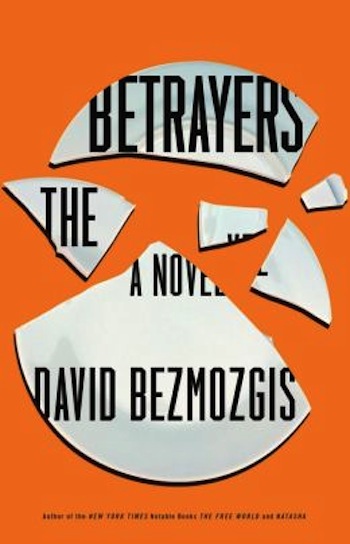Fuse Book Review: “The Betrayers” — A Powerful Vision of Jewish Life and its Contradictions
It took me until I was nearly done with The Betrayers to step back and realize that one reason I found it so absorbing is that alienation, such a given in contemporary fiction, plays no part.
The Betrayers by David Bezmozgis. Little, Brown and Company, 240 pages, $26.
By Harvey Blume

“It’s many years since I prayed,” says Baruch Kotler, the main character of David Bezmogis’s powerful new novel, when he returns from Jerusalem to the Crimea, where he spent his boyhood. “But who knows” he wonders, “how long it takes a prayer to reach God’s ears? And how long for Him to respond?”
Kotler had prayed regularly during the thirteen years of his imprisonment, interrogation, and not infrequently, torture by the KGB. What he prayed for above all was the “satisfaction of facing my tormentors as a free man.” Now he makes the shocking discovery that the rooming house in which he and Leora, his young lover, are staying is owned by none other than his chief tormentor, Vladmir Tankilevich.
Two decades ago, Kotler roomed with Tankilevich in Moscow, and deemed him an ally, another Jew longing for permission to emigrate to Israel. A group of such met regularly to remember or improvise liturgy and to inflict the bits of Hebrew they had learned on each other. It was at one such gathering that Kotler met Miriam, who he married. Tankilevich had joined this Zionist circle, too, but at the behest of the KGB, and it was his false testimony to the effect that Kotler was involved in anti-Soviet conspiracies that resulted in Kotler’s years of imprisonment.
In the interim, Kotler had prospered. Miriam had received permission to leave the Soviet Union and by the rules of their circle, was obliged to take advantage, though her husband remained behind. From Israel, Miriam launched a campaign for her husband’s release that garnered international attention and support, resulting, finally, in Kotler arriving in Jerusalem as something of a hero. He translates that cachet into influence in the Knesset.
Meanwhile, Tankilevich had withered. At age seventy he is “afflicted with cataracts, arrhythmia and sciatica. . . tormented body and soul.” He survives with his wife Svetlana by dint of assistance from the Hesed, a Jewish relief organization. But his KGB past is known to Hesed leaders, as is his role in Kotler’s jailing. In order to receive his stipend he must make a physically draining journey every Saturday to and from Simferopol, to show up at the synagogue.
Faced with Kotler, Tankilevich becomes a supplicant. He insists on being called Chaim rather than Vladmir. In a twisted sense, he blames Kotler for the work the KGB compelled him to do. The KGB had arrested his brother, a small-time criminal, and would have executed him had not Tankilevich offered his services. It was this service to the KGB that barred him from hopes of the kind of life Kotler had enjoyed, and sentenced him to scrape by in the Ukraine.
What is Kotler to do? He does not accept Tankilevich’s excuses and self-justifications. On the other hand, he does not congratulate himself unduly for his own unshakeable refusal to cooperate with the KGB. As he sees it, “The moral component is no different from the physical component — a man’s soul, a man’s conscience, is like his height or the shape of his nose.”
About those prayers he uttered regularly while in prison, he is ready to conclude they have outlived their usefulness. “Perhaps a prayer, is like a radio signal flying through space until it finds its mark. And the answer arrives not when you want it but when it suits God, when you have long since stopped waiting for it.”
It shouldn’t be concluded, though, for all his rumination about God and prayer, that Kotler has become devout. On the contrary, he counts himself among those Jews who are: “Not only godless but God-averse.” Those who inspired him during his years in Moscow’s Zionist underground — Chaim Weizmann, David Ben-Gurion, Vladmir Jabotinsky — were likewise of that number. For them, too, “the Bible was more a source of poetry and ancestral lore and less a guidebook for keeping house.”
What complicates life for him in Israel is that the influence of the God-averse, those who “had founded the country” has waned. Miriam, for one, has accepted the Bible and its edicts, as interpreted by Orthodox rabbis, as nothing less than “a guidebook for keeping house.” This makes for a coolness between husband and wife that results in Kotler’s affair with Leora, his young secretary, who loves and perhaps idolizes him. It was with her that he makes his climactic return to the Crimea.

Author David Bezmozgis — his latest novel is rich in Jewish life and its contradictions.
This is a book rich in Jewish life and its contradictions. For instance, Benzion, Kotler’s son, is in the army and wants his father’s permission to refuse orders to evict settlers. Kotler believes such settlements should remain and has made his position clear in the Knesset, in defiance of his party. (He is, in this regard, a dissident, once again.) But he does not believe Israeli soldiers have the right to disobey orders. Lacking his father’s blessing, Benzion resorts to a sacrificial measure, of a sort that brings Zionism itself into question.
The tensions with which this book abounds bring it to life. If there is a weakness it is perhaps that all involved share in ruminative eloquence, which can sometimes feel unearned. Svetlana, for example, Tankilevich’s wife, though uneducated, is as resourceful in dialectic as Kotler. None lack for words.
It took me until I was nearly done with the novel to step back and realize that one reason I found it so absorbing is that alienation, such a given in contemporary fiction, plays no part. Everyone, what with flaws and contradictions, admixtures of guilt and innocence, is completely involved, utterly implicated.
Bezmozgis, a Jewish emgré to Canada, has already shown in Natasha and Other Stories (2004) and in The Free World (2011), his first novel, that he is a gifted writer. The Betrayers is his most accomplished and satisfying book to date.
Harvey Blume is an author — Ota Benga: The Pygmy At The Zoo — who has published essays, reviews, and interviews widely, in The New York Times, Boston Globe, Agni, The American Prospect, and The Forward, among other venues. His blog in progress, which will archive that material and be a platform for new, is here. He contributes regularly to The Arts Fuse and wants to help it continue to grow into a critical voice to be reckoned with.
Tagged: Brown and Company, David Bezmozgis, Israel, Jewish life, Little
